

Converted or fabricated containers offer the ideal solution for tourist camps in game reserves across East Africa, aligning with the government's requirement of minimising the environmental impact throughout the 10-year permit period. Subsequently, the camp can either be dissolved or undergo further development and improvements. Here's why converted containers are the most environmentally-sensitive choice:
Converted containers provide an innovative and environmentally-sensitive solution for tourist camps in game reserves throughout East Africa. Their sustainable attributes help meet the government's requirement for a minimal environmental footprint, while still allowing for flexibility, adaptability, and the potential for further development or improvements within the 10-year permit period.
For more information about converted containers email sales.ke@almar.co.ke or phone +254 719 675 272.
Converted office containers have become a popular trend in Kenya as they offer a cost-effective and flexible solution to businesses that need additional workspace or a temporary office/s.
Almar East Africa specialises in the conversion of shipping containers into office spaces. The conversion process is done in-house by Almar’s team of specialists and this involves creating windows and doors in the container, adding insulation and ventilation, and installing electrical and plumbing systems. The interior is customised to meet the specific needs of the business, with options such as partitions, shelving, and lighting.




Almar converted office containers have several advantages over traditional office spaces. They are durable and can withstand harsh weather conditions. They are also portable and can be easily transported to different locations, making them suitable for businesses that need to move frequently or for temporary set-ups. Ideal for construction, housing or mining projects that require infrastructure for staff working on the development. Converted office containers offer a practical and cost-effective solution.
Container offices, also known as modular offices or converted shipping container offices, offer several benefits to businesses and organisations. Here are some of the key advantages of using a container office:
Flatpack containers, also known as modular or collapsible containers, are also an option for office containers.
Almar Flatpack Containers is a modular system that allows for the quick and simple assembly of a temporary or semi-permanent facility. Almar East Africa offers turnkey solutions in certain regions including office design, camp design, delivery, and assembly ensuring that you can focus on your core offering leaving the workplace and housing of your staff to the Almar East Africa team.


Due to the interchangeable panel system and modular nature of the flatpacks they can be used to construct multistorey buildings or office blocks, and once joined allow for a number of layout design options.
The Almar flatpack is a modular solution built within the dimensions of a standard 20’ container. Each Flatpack unit comes supplied with insulated panels, full electrics, vinyl flooring, 2 x windows, and 1 door.
For more information contact the Tel: +254 719 675 272 and sales.ke@almar.co.ke.
Almar’s custom-made, high-quality fabrication projects are implemented in partnership with the customer from idea inceptions to site mobilisation. These tailored container conversions are created by a team of ‘in-house’ engineers and design experts.
Eduardt Ruhling, MD for Almar’s East Africa Conversions, says that the team involved in creating bespoke container fabrications are highly skilled in their areas of expertise – design, engineering, manufacturing, and aesthetics.
“We specialise in bespoke container fabrications with the focus being on quality finishes and workmanship, and this is something that we take great pride and pleasure in. It is so rewarding to see the final product, created specifically for the end-use, in ‘action’ whether it be a coffee shop, a retail store, or a double-story office,” explains Eduardt.
According to Richard Bell, Operations Director of Rural Retail for the One Acre Fund in Kenya, Almar played a key role in helping them achieve rapid expansion of their rural retail network. “We appreciate the good levels of communication and collaborative approach to addressing issues when they arise. The team is great to work with - responsive, professional, and takes great pride in their work,’’ comments Richard.




Another customer, Ritesh Doshi, CEO of Spring Valley Coffee says, “Almar was a thought partner as we designed and built our container café. They clearly know their craft and gave us the best advice for our needs. Their commitment to quality is evident, and the outcome is reflective of our brands and fit for purpose.”


For more please information please contact Eduardt on +254 700 036 742 or +254 719 675 272 or email eduardt@almar.co.ke.
It can be a false economy to purchase a container office outright for a short contract away from base. That’s because it’s not always easy to provide the assurances the reseller market needs. Most purchasers prefer to source their rental office containers from reliable suppliers including Almar Container Group. We supply our intermodal shipping containers with rock solid warranties and all your questions answered.
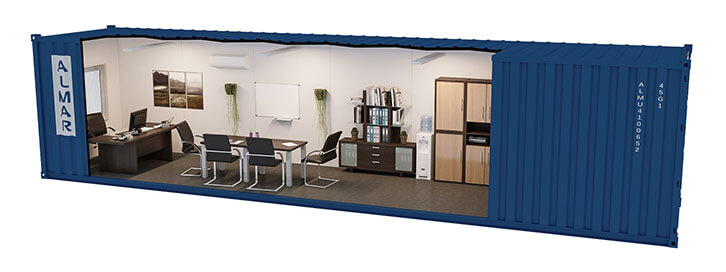
We need flexibility above most things in a dynamic economy. What seemed the ideal location may no longer prove to be the right decision as a project rolls out. Intermodal shipping containers are designed with the intention of moving around. They have secure lifting points at all eight corners and are strong enough to support far more weight than a fitted office.
Hence intermodal shipping containers make perfect temporary office accommodation. Moreover, our rental office containers may come complete with electrical, plumbing and drainage reticulation. All you need do is connect them with the necessary services. How hassle-free is that, compared to erecting a prefabricated building that may not disassemble, move, and reassemble again properly?
Find more answers to your questions here.
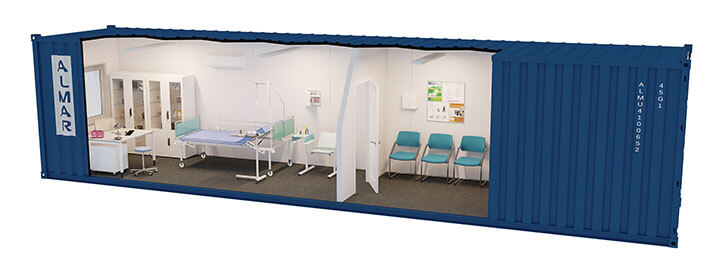
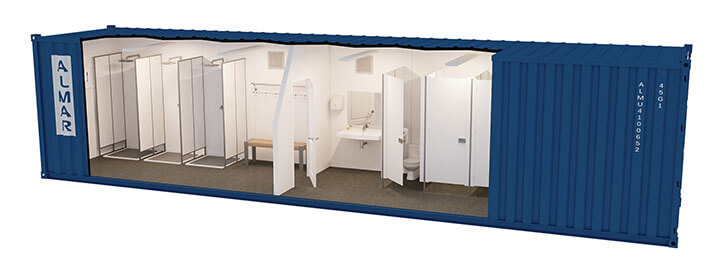
We extend the life of intermodal containers by finding new uses for them. We believe in recycling things because new construction comes with carbon costs. Our robust, modular range includes:
Speak to Almar Container Group in confidence for all your rental office container solutions soon.
Shipping container home builders are an increasingly familiar sight in parts of South Africa where city regulations do not apply. Hence they make perfect farmsteads and superior accommodation in rural areas and informal settlements. Elsewhere, municipal authorities are still catching up with the new technology so special permission is required.
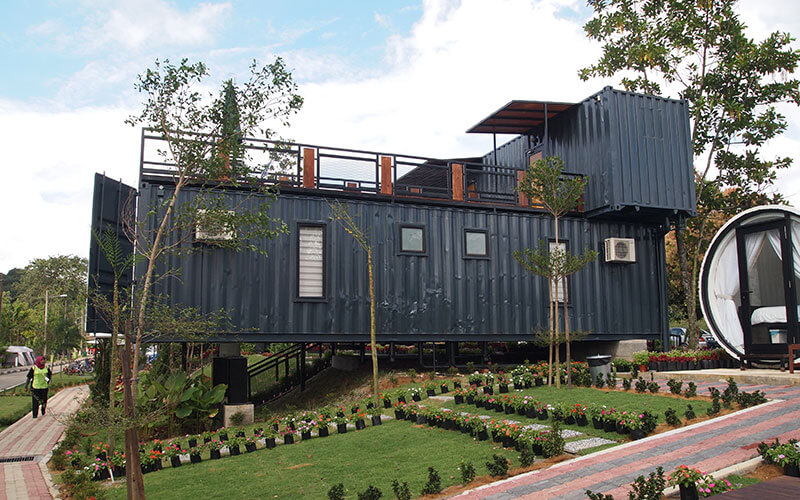
Inspect Your Future Home Before You Buy: Intermodal shipping containers have a tough time as they travel the seven seas, and ride on railways and roads to the four corners of the earth. Some are in surprisingly good shape except for light surface rust. Others are badly dented with weakened welds. Insist the seller lifts your container up with a crane so you can check the underside.
Understand How Structural Integrity Works: A shipping container is a box with rigid doors adding extra strength. There is no internal cross-bracing. Hence it follows cutting openings without careful thought could weaken the design. Ask your container supplier for advice. It’s their business, they should know.
Begin Your Upgrade with Thermal Insulation: Experienced shipping container home builders know intermodal container insulation is limited. They begin their work by spraying foam on the inside walls that double as a flame retardant. Then they fit a false ceiling inside that vents through the roof and feeds power to the overhead lights. Finally, they fit a slightly raised floor to their new home.
Use a Single Contractor for the Entire Project: Project-managing the conversion using multiple contractors works well if you understand the various trades. If not, they could run rings around you by blaming each other for defects. If you are unsure, find a decent shipping container supplier who can manage the whole job. Even better, have them do the conversion for you, and deliver a complete home to your site.
Then Let Your Imagination Run Riot: Experienced shipping container home builders provide the basics. Then it’s up to you to add the furniture and the drapes. Use some of your savings, compared to brick and mortar to spoil your family just a little. How about buying that home entertainment centre you always wanted?
An entry-level shipping container home builder new to the game can make a difference in their family’s lives with this brilliant technology, and things can happen fast with the right provider. Explore more ideas through these selected posts from our popular blog.
Selected Posts:
We have to be precise about the length of every 20ft container we supply. That’s because they have to fit on top of each other and squeeze easily into tight spaces. There were freight containers in the UK in the 1830’s for transferring coal from railways to horse-drawn carts.
However they only really took off in the 1950’s after the U.S. Army developed rigid steel containers with lifting rings. Hence container lengths measure in feet not meters.
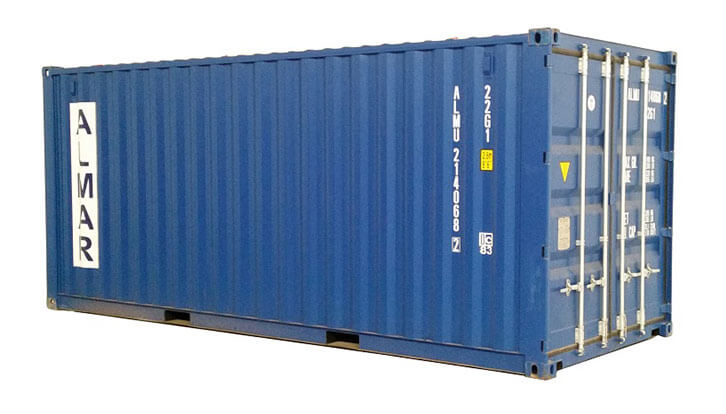
The 20ft container is the smallest in the standard range. Thus this container design is popular for transporting goods to locations with less sophisticated lifting and carrying equipment. We call them intermodal containers because they can travel in different modes of transport.
There are other names for these amazing devices that can travel by ship and rail and truck. These include cargo / freight container, iso container, shipping / sea / ocean container, container van, sea can, or just container.
Every ounce of energy we use contributes to greenhouse gas, and humans are currently causing too much of it. Moreover, the same applies to building construction. Our lightweight 20ft containers are in aluminium because this considerably reduces lifting and transportation costs. Moreover when their intermodal days are over they find other uses as transportable buildings.

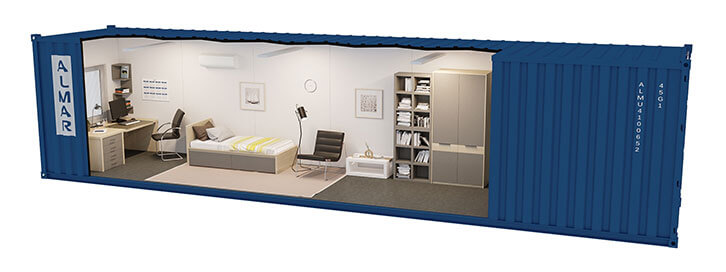




A 20ft container becomes a habitable building when we add a door and window and fit it out. Moreover being lightweight aluminium makes this a fairly easy task. The attachment points on all eight corners simplify transport by ship and rail and truck, and even cargo airplanes. As a consequence, our engineers are able to assist with these cost / time saving projects:
Qatar is building a modular, demountable soccer stadium for the 2022 FIFA World Cup. This 40,000-seater is rising from the desert immediately southeast of Doha on the Persian Gulf. The modified shipping containers sit within a steel framework creating the perimeter wall and tiered seating.
A variety of reinforced 20ft container versions and larger types will have pre-installed stairs, concessions, and bathrooms. This uses fewer materials, creates less waste, and leaves a lighter carbon footprint. They can move the Ras Abu Aboud Stadium to its first legacy location when the games are over. A renewable soccer stadium, who would have thought of that…
There was a time when steel storage containers were simply used to move cargo across vast tracts of land or between continents, and then sometimes, once they reached their destination, for continued storage of the transported goods.
Today, storage containers, which are also commonly known as dry freight shipping containers, have a multitude of uses from retail outlets, workshops, and offices, to clinics, and even stylish upmarket homes.
While steel storage containers are essentially just boxes, if you’re considering a shipping container conversion, then you’re going to have to think out of the box!
The standard sizes of general purpose (GP) storage containers are defined by international standards that are set by the International Organization for Standardization (ISO). This includes the internal dimensions used for the design of steel shipping containers as well as external dimensions. The standards also specify minimal internal measurements for door openings.
In general terms, GP storage containers are referred to internationally as being either 10 foot, 20 foot, or 40 foot in size. The metric conversions for these dimensions are 2.991 m, 6.058 m, and 12.192 m.
The width of all these containers is the same, 8 feet or 2.438 m. The standard height is 8.5 feet or 2.591 m, with 9.5 feet/2.896 m “high cube” units adding an extra foot in height to the container.
So, there are just five sizes and they don’t provide many choices. Or do they?
The limited standard sizes of storage containers belie their versatility. This is because they are modular in character and one, two, or multiple containers may be used together for conversion projects.



Shipping containers that are designed for the storage of goods during transportation are strong, durable, and highly mobile, meaning they can be moved with ease.
When it comes to using them for conversions, storage containers manufactured for shipping have numerous advantages. Even though not originally designed for any form of conversion, they can be repurposed with ease. Furthermore, the conversion process is incredibly quick when compared to most other forms of construction.
All you need to do is consider the container as a building shell. You don’t need major foundations to support it, and so it will enable you to cut costs right from the beginning. No extensive earthworks are required either.
The fact that storage containers are modular is one of the major benefits when it comes to conversions because they can be used alongside one another or on top of other units. They are also incredibly easy to customise. They may even be used to create multiple storey buildings. You will need professional input, and the conversion will need to meet local building regulations, but site work and basic structural work are simplified.
The beauty of steel shipping storage containers is that they can be used as-is for storage, or they can be repurposed to meet any specifications.
We have new and used containers that can be used for just about anything, from accommodation to ablutions. We also offer converted shipping containers that are ideal for on-site use, particularly in remote locations.
Call us today to see how we can help with the storage containers we have in stock.